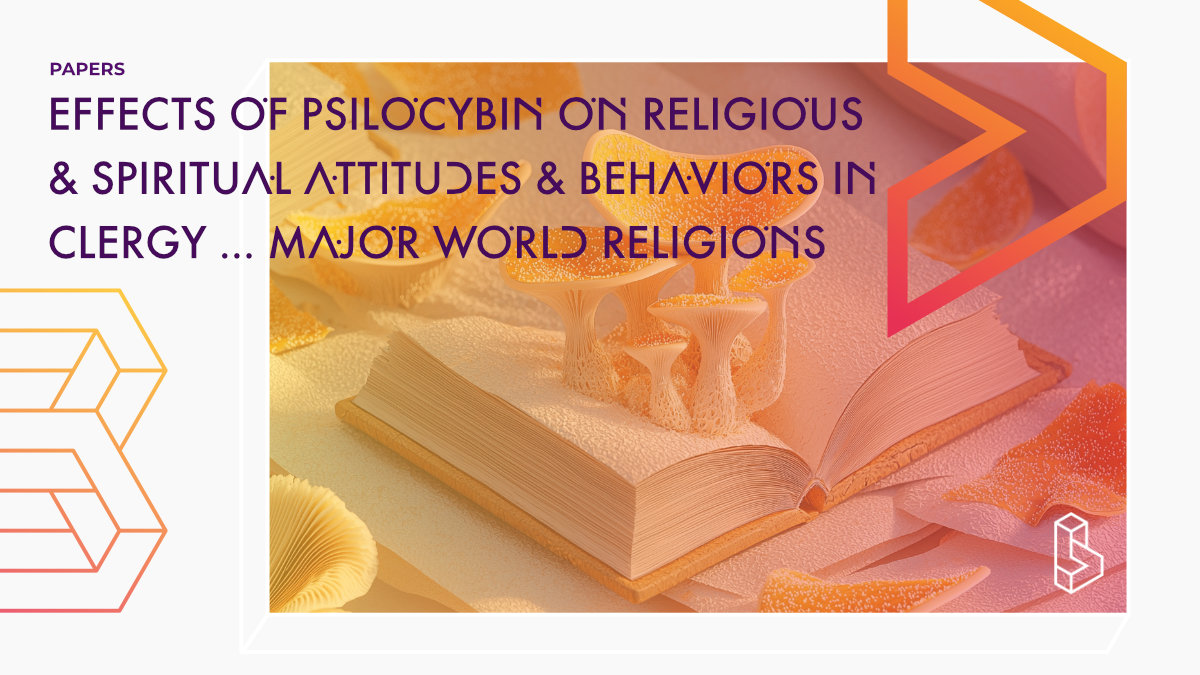This randomised, waitlist-controlled exploratory study (n=29) of psychedelic-naïve clergy delivered two supported psilocybin sessions (20mg/70kg followed a month later by 20-30mg/70kg). Six months after screening (and still evident 16 months later) the psilocybin group showed sustained improvements in religious practice, leadership effectiveness and overall well-being, with 96 % ranking at least one session among their five most spiritually significant life events and no serious adverse events despite 46 % describing the experience as among their five most challenging.
Abstract of Effects of Psilocybin on Religious and Spiritual Attitudes and Behaviors in Clergy from Various Major World Religions
“Background: Although historical writings, anthropological accounts, and experimental studies document associations between psilocybin use and religion, no prospective experimental study has investigated how the effects of psilocybin are experienced and interpreted by religious clergy. This exploratory study evaluated the overall safety and the acute and enduring effects of psilocybin in clergy.
Methods: Participants were psychedelic-naïve clergy from various major world religions. A randomized, parallel group, waitlist control design was used to assess the effects of two supported psilocybin sessions, with participants receiving 20 and then 20 or 30 mg/70 kg about 1 month later. Outcomes were compared between the Immediate Group (n = 13) and the Delayed Group (n = 16) at 6 months after screening using self-report measures. The effects of psilocybin were also assessed on session days and 4 and 16 months after the second psilocybin session in the 24 participants who completed both sessions.
Results: The primary outcome assessment at 6 months after screening showed that, compared with the delayed control group, participants who had received psilocybin reported significantly greater positive changes in their religious practices, attitudes about their religion, and effectiveness as a religious leader, as well as in their non-religious attitudes, moods, and behavior. Follow-up assessments showed that positive changes in religious and non-religious attitudes and behavior were sustained through 16 months after the second psilocybin session. At that time, participants rated at least one of their psilocybin experiences to be among the top five most spiritually significant (96%), profoundly sacred (92%), psychologically insightful (83%), and psychologically meaningful (79%) of their lives. Furthermore, 42% rated one of their experiences to be the single most profound of their lifetime. At 16-months follow-up, most (79%) strongly endorsed that the experiences had positive effects on their religious practices (e.g., prayer or meditation) and their daily sense of the sacred, and most (71%) reported positive changes in their appreciation of religious traditions other than their own. Although no serious adverse events were reported, 46% rated a psilocybin experience as among the top five most psychologically challenging of their lives.
Conclusions: In this population of clergy, psilocybin administration was safe and increased multiple domains of overall psychological well-being including positive changes in religious attitudes and behavior as well as their vocation as a religious leader. The study was limited by a waitlist control design, homogenous sample, and the use of some unvalidated outcome measures. Further research with more rigorous control conditions and diverse samples is needed.”
Authors: Roland R. Griffiths, Robert Jesse, William A. Richards, Matthew W. Johnson, Nathan D. Sepeda, Anthony P. Bossis & Stephen Ross
Summary of Effects of Psilocybin on Religious and Spiritual Attitudes and Behaviors in Clergy from Various Major World Religions
Psilocybin, the psychoactive compound in so-called “magic mushrooms”, acts chiefly on the brain’s 5-HT2A serotonin receptors, leading to temporary but often intense alterations in perception, emotion and meaning. Psychologists label its most striking states “mystical” because they frequently feature a powerful sense of unity (“all is one”), an authoritative feeling that the insights are unquestionably true (the noetic quality), and an experience of the sacred that seems to sit outside ordinary time and space. Earlier research with healthy volunteers and clinical populations has shown that such experiences can improve well-being for months or even years. Yet almost nothing was known about how trained clergy, embedded in the structures and doctrines of major world religions, would interpret and integrate the experience. Griffiths and colleagues therefore set out to examine both the safety profile and the short- and long-term impact of psilocybin on religious leaders’ attitudes, practices and pastoral effectiveness.
The study also sought to address a long-standing debate in the study of religion: whether chemically induced mystical encounters are “genuine”. Some theologians argue they are not, suggesting that psychedelics merely mimic authentic revelation. By working with ordained leaders from Christianity, Judaism, Islam and Buddhism who had never used psychedelics, the authors hoped to clarify how individuals steeped in formal theology and liturgy would evaluate the experience and whether it would reverberate through their ministries.
Materials and Methods
Participants
Study details
Compounds studied
Psilocybin
Topics studied
Healthy Subjects
Study characteristics
Original
Open-Label
Randomized
Participants
29
Humans
Compound Details
The psychedelics given at which dose and how many times
Psilocybin 20 - 30mg | 2x

